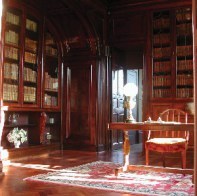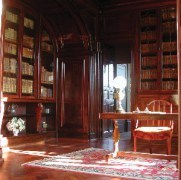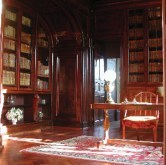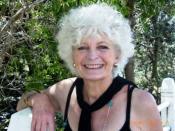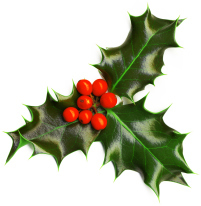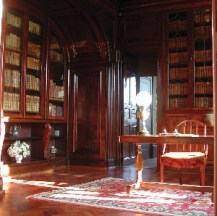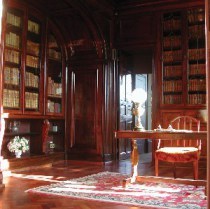Pam Lecky's Blog, page 38
January 15, 2016
A Conversation with Author, Michael Wills
In the Library today we have Michael Wills, who has dropped in to say hello and to share some insights into his life as an author.
You are very welcome, Michael, please introduce yourself:
 I grew up on the Isle of Wight at a time when the railway engines really did go cho cho. At school I became an avid reader and I still have my “Head Librarian” badge to prove it. On leaving school, I trained to be a teacher and then spent two years working in a very rural secondary school in Kent. So rural in fact, that children would frequently use the excuse that they could not hand in their homework as the school farm’s goats had eaten their books.
I grew up on the Isle of Wight at a time when the railway engines really did go cho cho. At school I became an avid reader and I still have my “Head Librarian” badge to prove it. On leaving school, I trained to be a teacher and then spent two years working in a very rural secondary school in Kent. So rural in fact, that children would frequently use the excuse that they could not hand in their homework as the school farm’s goats had eaten their books.
I retrained to teach English as a Foreign Language and then spent 13 years working in Sweden before returning to the UK with my Swedish wife and three daughters to start a language school. I sold the school ten years ago and retired.
I have a plethora of interests and hobbies, primary amongst them is a fascination with history, especially the Viking period. Apart from spending a great deal of time researching and writing historical novels, I am an amateur radio ham and an even more amateur carpenter. I sail my little boat for two months each summer, and whenever the opportunity arises I thoroughly spoil my grandchildren.
Did you read much as a child? Are you an avid reader now? Do you prefer books in your own genre or are you happy to explore others?
Looking back now I can see that as a child I developed a very enquiring mind and this has endured. I read far more non-fiction than fiction. This is especially important as part of the research process for my stories. Although in the past I read books from a wide range of genres, today I read mainly historical books. However, I have to confess that I have a sneaking fear that I will subconsciously “borrow” ideas from other writers, so I tend to avoid reading novels based in the same time period as that which I am currently writing about. Having said that, I have to admit that at the moment I am re-reading the classic Viking story – “The Long Ships”.
Are you self-published or traditionally published?
When I was working in Sweden I wrote and co-wrote a number of English language teaching course books. These were traditionally published. So I am fully aware of the benefits and the drawbacks of working with a publishing house and also the huge time lag between manuscript and finished book. When I started to write novels, the knowledge that thousands of books are published each month and that the field is intensely competitive, daunted me somewhat. At my age, I do not have the time to do the rounds of agents and publishers for several years, trying to get attention. So I decided to self-publish.
Which genre do you write in and why?
As I have mentioned, my speciality is historical novels. However, I have tried something else. My wife assiduously reads and re-reads every version of my manuscripts before they go for editing, however, she is not overly fond of historical novels. To provide some relief for her I decided to write a thriller. “One Decent Thing” is currently being edited and I hope to publish it next year.
Who has been the biggest influence on your writing?
Without doubt what initially moved me to start writing was “places and things”. Let me explain. I have had the privilege of travelling extensively; it was the nature of my work when I had a language school. I took every opportunity to visit places of historical interest and researched them thoroughly. Travel is still the biggest influence on what I write, be it sailing into an old Viking harbour, watching an historical re-enactment such as the Battle of Saratoga or visiting an ancient castle. There is nothing more inspirational for me than experiencing historical environments, seeing or perhaps touching ancient artefacts and treading the ground where my historical characters might have walked.
Has your country of origin/culture influenced your writing?
Undoubtedly the rich history of the Isle of Wight, (I went to school just an arrow shot from Carisbrooke Castle), stimulated an interest in the subject. But there was another thing which affected me and many others. It may seem difficult to believe now, but in the forties and fifties, the Island was very isolated and one felt cut off from the rest of Britain. I knew adults who had never visited the “mainland”. This isolation helped me to develop a strong sense of imagination and, as I have already mentioned, curiosity.
What part of the writing process do you find most difficult? How do you overcome it?
In my specialisation the most difficult thing is to get the right balance between history and fiction. One has to be absolutely true to the facts without letting them overwhelming the story. When I met the editor who had done a structural edit on my novel, “The Wessex Turncoat”, she suggested that I might be more comfortable writing historical non-fiction. That was a real wake-up call for me. I took the manuscript away and re-wrote it with a much stronger story line.
Do you have a favourite time of day to write?
I have this old fashioned Anglo Saxon work ethic, no reward without effort. Thus I have to justify the luxury of my mid-morning coffee with a couple or three of hours of writing. Yes, the mornings are the best time for me.
What is the best thing about being an author? And the flipside – what is the worst?
Without a shadow of doubt, the best thing is to have someone tell you that they enjoyed reading your book. The worst thing is that writing is a very introverted activity, a lonely process, natural ebullience has to be subdued, I sometimes find that quite an effort.
Is social media an essential chore or something you enjoy? Which forum do you prefer?
I resisted getting involved with social media for a long time, partly because I did not understand its value but also, quite frankly, the whole thing seemed a bit like a dark art to me. However, when one of my daughters started a social media company, resistance was pointless. I now enjoy using Facebook and Twitter, though I find the former to be the more useful.
If you weren’t an author, what would you be up to?
Up to no good at all I fear. I really need an outlet for a vivid imagination. However, if I were to be banned from using a computer I think I would dust off my old guitar, learn to play properly and imagine that I really missed my calling in the sixties, or perhaps fritter away the hours with a fishing rod in my hand, day dreaming about the sails of Viking ships appearing over the horizon.
It’s the last day and the earth is facing oblivion – what book would you read?
What a difficult question! I have considered this at great length and my putative answer ranged from the bible at one end of the scale to Spike Milligan at the other. However, what I eventually alighted on was that I would read my diary. I kept a diary all through the sixties and part of the seventies, and then started again in the nineties. What better way to exit the world than to consider what I did when I was here and be grateful for having lived, loved and laughed through one of the most remarkable periods in history.
Please tell us what you are working on or your latest published work.
In a sense my career has gone full circle, the teacher in me came to the fore and I decided to write a trilogy of  Viking adventure stories for children headlined, “The Childre
Viking adventure stories for children headlined, “The Childre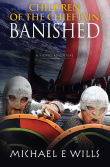 n of the Chieftain”. The first one, “Betrayed” was published in June and I was delighted to have it chosen by the Historical Novel Society for their 2016 Indie competition longlist. It also gave me a huge thrill to find that the book was being used in some primary schools. To assist its use in schools I have a free download Activities Booklet on my website. The second book in the series, “Banished”, will be published later this month.
n of the Chieftain”. The first one, “Betrayed” was published in June and I was delighted to have it chosen by the Historical Novel Society for their 2016 Indie competition longlist. It also gave me a huge thrill to find that the book was being used in some primary schools. To assist its use in schools I have a free download Activities Booklet on my website. The second book in the series, “Banished”, will be published later this month.
You can find out more about Michael and his books at the following links:


January 10, 2016
Edith Somerville, Irish Author (1858-1949)
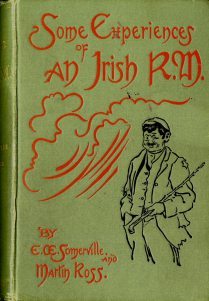 Sometimes I cannot believe my luck. Pondering on where to start the research for my next novel, I suddenly remembered how much I had loved watching The Irish RM on TV. I was fairly sure it was the right period and remembered how affectionately my father had spoken of the novels of Somerville & Ross. So off I went and downloaded a few of the books. I could not believe it. What better source of contemporary writing could there be; set in the south of Ireland and in the timeline of my current work in progress! Of course the novels are dated but the level of detail, from a research point of view, is pure gold. What surprised me most was the writing; the descriptions are often lyrical and the underlying humour had me chuckling away.
Sometimes I cannot believe my luck. Pondering on where to start the research for my next novel, I suddenly remembered how much I had loved watching The Irish RM on TV. I was fairly sure it was the right period and remembered how affectionately my father had spoken of the novels of Somerville & Ross. So off I went and downloaded a few of the books. I could not believe it. What better source of contemporary writing could there be; set in the south of Ireland and in the timeline of my current work in progress! Of course the novels are dated but the level of detail, from a research point of view, is pure gold. What surprised me most was the writing; the descriptions are often lyrical and the underlying humour had me chuckling away.
I had to find out more about Edith Somerville.
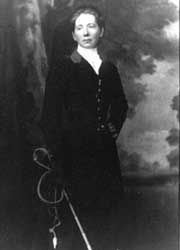 Edith
EdithShe was born on the 2nd May 1858 in Corfu, daughter of an army officer. A year later, they returned to the family home at Drishane, Castletownshend, Co. Cork. Edith’s family was well connected, being acquainted with the likes of W.B. Yeats and Lennox Robinson and related to George Bernard Shaw, Lady Augusta Gregory and Sir Arthur Conan Doyle.
Edith was a devoted sportswoman who in 1903 had become master of the West Carbery Foxhounds. Her love of the sport is often the back bone of many of the RM stories. She was a fine artist and studied in London, Dusseldorf and Paris and her paintings were exhibited in Dublin, London and New York. She became president of the Munster Women’s Franchise League (a suffragette movement) but it is her writing partnership with her cousin, Violet Martin, that she is most remembered for. This is how Edith described her first meeting with her second cousin:
“It was, as it happens, in church that I saw her first, in our own church, in Castletownshend. That was on Sunday, January 17, 1889… it has proved the hinge of my life, the place where my fate, and hers, turned over, and new and unforeseen things began to happen to us.”
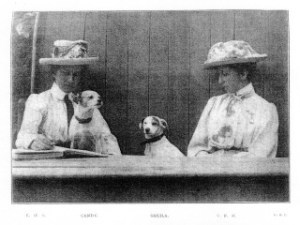 Both ladies had already published, but over a year after they first met they began work on their first novel together, An Irish Cousin. Violet adopted the pseudonym ‘Martin Ross’, using her surname and the name of the family seat in the West of Ireland. At the time the ‘Shilling Shocker’ was fashionable and they first approached writing in this vein, but as their relationship progressed their artistic ideals changed. They were delighted when An Irish Cousin was accepted for publication. Their second novel, Naboth’s Vineyard (1891) received good reviews and they began to take themselves seriously. Their full-length novel, The Real Charlotte, was published in 1894 but only after they had overcome all of the difficulties of being single ladies, existing purely on pin money and being expected to fulfil all of the demands of their respective families.
Both ladies had already published, but over a year after they first met they began work on their first novel together, An Irish Cousin. Violet adopted the pseudonym ‘Martin Ross’, using her surname and the name of the family seat in the West of Ireland. At the time the ‘Shilling Shocker’ was fashionable and they first approached writing in this vein, but as their relationship progressed their artistic ideals changed. They were delighted when An Irish Cousin was accepted for publication. Their second novel, Naboth’s Vineyard (1891) received good reviews and they began to take themselves seriously. Their full-length novel, The Real Charlotte, was published in 1894 but only after they had overcome all of the difficulties of being single ladies, existing purely on pin money and being expected to fulfil all of the demands of their respective families.
The novel was well received but they were urged to write short stories by their agent. The huge success of their Some Experiences of an Irish R.M. in 1899, led to a demand for more stories of the same kind. They published two further sets of these, Further Experiences of an Irish R.M. in 1908 and In Mr Knox’s Country, in 1915.
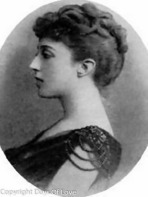 Violet
VioletThen devastation struck; in 1915 Violet died of a brain tumour in a Cork nursing-home and Edith, shattered by grief, determined to write no more. She was in London still recovering from the shock of Violet’s death when the Easter Rising of 1916 broke out. On 9 May she wrote a letter to The Times, blaming the British government for the state of affairs in Ireland. After that she tended towards Irish Nationalism, and as an adept musician at parties she specialized in Irish tunes and Nationalist songs.
Around this time she turned to spiritualism and believed she could communicate with Violet’s spirit through séances. She was convinced that Violet wished her to go on writing. Thereafter, she insisted on using the pseudonym of ‘Somerville and Ross’, as she believed that the spirit of her dead partner was actively assisting her. She was to go on to write five further novels and various other works in the course of the next thirty years.
She was awarded the degree of Doctor of Letters by Trinity College Dublin in 1932. In the same year, W.B. Yeats invited her to become a member of the Irish Academy of Letters and, nine years later, the Academy bestowed on her the Gregory Gold Medal, its most important literary award.
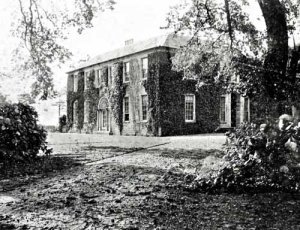 Drishane House
Drishane HouseShe lived on at the family residence, Drishane House, until 1946 and then moved, with her younger sister Hildegarde, to a house in the main street of Castletownshend, which bore the name ‘Tally-Ho’, the name which the cousins had used for the residence of Charlotte Mullen in The Real Charlotte. She died in 1949 at the great age of ninety-one.
Collaborative novels
An Irish Cousin (1889)
Naboth’s Vineyard (1891)
In the Vine Country (1893)
Through Connemara in a Governess Cart (1893)
The Real Charlotte (1894)
Beggars on Horseback (1895)
The Silver Fox (1897)
Some Experiences of an Irish R. M. (1899)
A Patrick’s Day Hunt (1902)
All on the Irish Shore (1903)
Some Irish Yesterdays (1906)
Further Experiences of an Irish R.M. (1908)
Dan Russell the Fox (1911)
In Mr Knox’s Country (1915)
Solo novels
Irish Memories (1917)
Mount Music (1919)
The Big House at Inver (1925)
The States through Irish Eyes (1930)
An Incorruptible Irishman (1932)
The Smile and the Tear (1933)
The Sweet Cry of Hounds (1936)
Sarah’s Youth (1938)
Maria and Some Other Dogs (1949)


January 8, 2016
A Conversation with Author, Carla Vermaat
Today in the Library we have Carla Vermaat, who has dropped in to say hello and to share some insights into her life as an author.
You are very welcome, Carla, please introduce yourself:
My name is Carla 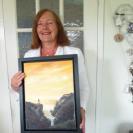 Vermaat. I am originally from The Netherlands, but I live in Cornwall in the UK now for about 10 years. In Holland I have published 20 crime thrillers and romance novels – the next one is going to the printer as we speak. I also wrote over 65 romance stories (23k words) for a Dutch magazine. I currently live on the Cornish north coast, close enough to the beach to go for a walk.
Vermaat. I am originally from The Netherlands, but I live in Cornwall in the UK now for about 10 years. In Holland I have published 20 crime thrillers and romance novels – the next one is going to the printer as we speak. I also wrote over 65 romance stories (23k words) for a Dutch magazine. I currently live on the Cornish north coast, close enough to the beach to go for a walk.
Did you read much as a child? Are you an avid reader now? Do you prefer books in your own genre or are you happy to explore others?
I have always been reading. I remember we celebrated ‘Sinterklaas’, sort of the Dutch equivalent of Santa Claus, only the date is on the 5th December. As a family we used to come together at my grandmother’s and as we were with 8 adults and 6 children, we all had only one or two presents. Mine was always a book and as soon as it was time to unwrap it (which we did in turns) I started to read it… I have periods that I read a lot, other periods I don’t read at all. I tend to prefer books in my own genre, there are enough available!
Are you self-published or traditionally published?
Both. I am still publishing my books in The Netherlands in Dutch with Ellessy, a publishing house. (In Holland authors generally don’t deal with literary agencies). My (first) book in English is partially self published, in cooperation with my Dutch publisher, but I do the marketing, etc., here myself.
Which genre do you write in and why?
I mostly write crime, although occasionally my Dutch publisher asks for a contemporary romance. I do one-offs but I am also writing one book a year for a series about an Amsterdam based policewoman. My first book in English, Tregunna, is also the first of a series.
Who has been the biggest influence on your writing?
I can’t say. Reading other books, I guess, made me jealous and itchy do start writing my own. When I had my first job in an office at about 18 (as a merchandiser’s assistant) I told my boss I wasn’t interested in a career in the company, because one day I would be an author. I can still remember him laughing about my arrogance …
Has your country of origin/culture influenced your writing?
I don’t think so, although we can never wipe what has formed us or our experiences.
What part of the writing process do you find most difficult? How do you overcome it?
Proofreading is my worst nightmare. I hate to have to read the story over and over again when I get it back from the editor. I can’t say you can overcome it, you just have to sit down, get your head into gear and do it.
Do you have a favourite time of day to write?
Mornings are better, although I can write any time of day.
What is the best thing about being an author? And the flipside – what is the worst?
Best thing is that you can let your imagination go, create families and characters and live a second life for a while. There is no flipside – I love it.
Is social media an essential chore or something you enjoy? Which forum do you prefer?
Having partially self-published Tregunna, I became aware that I didn’t know enough about marketing. I have always believed that a good thing only needs word-of-mouth advertisement, but this industry is slightly different. Eventually you will get there without any marketing, but it may take a few years, or even decades. I don’t particularly like using platforms such as FB and Twitter, etc., because it takes so much time – which may explain why I don’t use them much.
If you weren’t an author, what would you be up to?
Painting; when I’m not writing, I paint landscapes and seascapes.
It’s the last day and the earth is facing oblivion – what book would you read?
I wouldn’t read, I would write – about my feelings, I guess.
Please tell us your latest published work.
My book is called, TREGUNNA.
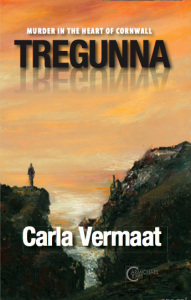 In a farmhouse on the Camel estuary in Cornwall, a 5-year old girl finds her parents brutally slaughtered. Fifteen years later the house is deserted and the killing still remains a mystery.
In a farmhouse on the Camel estuary in Cornwall, a 5-year old girl finds her parents brutally slaughtered. Fifteen years later the house is deserted and the killing still remains a mystery.
Then the body of a 50-year old woman is found on a cliff edge in Newquay. DI Andy Tregunna is faced with the task of leading the investigation, but soon personal matters force him to step back.
On compassionate leave and with little else to do than fight his own demons, the unsolved case becomes more and more an obsession to him. As he is drawn deeper into a dark world of secrets, lies and revenge, his private investigation collides with his personal life.
The truth is even more sinister than can be imagined …
Carla is a member of Crime Writers Association (www.thecwa.co.uk)
You can find out more about Carla and her books at the following links:


December 29, 2015
A Conversation with Author, Zara Stoneley
This evening in the Library we have Zara Stoneley, who has dropped in to say hello and to share some insights into her life as an author.
You are very welcome, Zara, please introduce yourself:
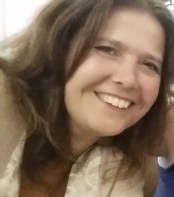 I grew up in small village in Staffordshire. After completing a degree, working as an IT consultant, and then combining running a dog grooming business with family life, I returned to my love of writing. In 2012, I secured my first publishing contract with Xcite Books, the erotic imprint of Accent Press, and a year later signed a deal with HarperCollins.
I grew up in small village in Staffordshire. After completing a degree, working as an IT consultant, and then combining running a dog grooming business with family life, I returned to my love of writing. In 2012, I secured my first publishing contract with Xcite Books, the erotic imprint of Accent Press, and a year later signed a deal with HarperCollins.
I now write fun, romantic romps set in the British countryside and split my time between a country cottage in a Cheshire village, surrounded by family, friends and assorted animals, and an apartment in Barcelona.
Did you read much as a child? Are you an avid reader now? Do you prefer books in your own genre or are you happy to explore others?
I’ve always been an avid reader and as a child spent most of my time in my bedroom curled up with a book – refusing to go down for dinner until I’d finished my chapter! At various times as my son grew up, I had less time to bury my nose in a book, but now he’s gone to University I’m back to reading more than ever. I read all sorts, from books by Jilly Cooper and Fiona Walker that are similar to my own, to romcoms, thrillers and anything else that grabs my fancy. My son recently thrust a copy of ‘Game of Thrones’ into my hands and insisted that as I enjoyed ‘Lord of the Rings’ I would love it. One wonderful thing about being an author is that you also quite often get copies of new books from your publisher.
Are you self-published or traditionally published?
Mainly traditionally, although I have self-published an erotic romance trilogy which I am planning on re-releasing soon – reworked with the eroticism toned down.
Has your country of origin/culture influenced your writing?
Where I live now has definitely influenced my writing; my editor suggested that I write a series of books set in horsey Cheshire and these novels are firmly anchored in the English countryside and its way of life.
What part of the writing process do you find most difficult? How do you overcome it?
I always find the middle of the book a challenge, however well or badly I have planned it out in advance. I think this is the critical point where you know whether you understand your characters, their motivations and conflicts well enough, and whether the plot is working with or against them. My solution is always to stop trying to squeeze the words out, go back to the drawing board and look more closely at the main characters. It then becomes obvious (nine times out of ten!) what is missing, or where adjustments to the original plan need to be made. A plan is fine, but quite often I find that characters have developed in unexpected ways!
Do you have a favourite time of day to write?
I find it easiest to work in the morning if I’m plotting, but if I’m in full flow writing then late evening is my most productive time.
What is the best thing about being an author? And the flipside – what is the worst?
I just love writing, creating new settings and characters, watching them develop and conquer their fears and all the obstacles I throw in their path. Holding the finished book in my hand once it has been published has to be the highlight though. On the downside I have to cite negative reviews – a story is such as subjective things and although authors know that some people will love their books, love their voice, they also know that others will not – and sometimes vehemently dislike what they read.
Is social media an essential chore or something you enjoy? Which forum do you prefer?
It can be very time consuming, and definitely needs managing or I can find that half the day has been devoted to social media and no words have been added to my book – the most important thing! I think Facebook is the most rewarding forum as you can engage properly with people, but twitter is great for keeping things snappy. I’m also starting to explore Pinterest and Instagram, but these are fairly new to me.
If you weren’t an author, what would you be up to?
I always wanted to be a vet when I was younger, but somehow ended up an IT consultant! But I ran a dog grooming business when my son was young, and still love my animals… so it would probably be something pet related!
Please tell us about your latest published work.
My latest book is ‘A Very Country Christmas’ is a free novella.
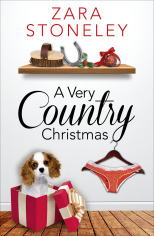 A short Christmas story of three courses: Love is in the air in Tippermere, as Lottie dreams of a white Christmas with no trimmings – other than her hot and hunky eventer, Rory. But things are never quite that simple on the Tipping House Estate.
A short Christmas story of three courses: Love is in the air in Tippermere, as Lottie dreams of a white Christmas with no trimmings – other than her hot and hunky eventer, Rory. But things are never quite that simple on the Tipping House Estate.
Festive fervour takes over and it isn’t all seasonal peace and goodwill as expectations rise and it soon escalates from cosy dinner for two, to all the trimmings for ten! With missing turkeys, loose horses, troublesome terriers and randy huntsmen, Lottie is hard pushed to find time for a kiss under the mistletoe, let alone find the opportunity to woo Rory with her sexy Santa costume.
But there is only one thing Lottie really wants for Christmas, and only one man can deliver it…
Available FREE from – Amazon Barnes & Noble Kobo Sainsbury’s Google Play
To learn more about Zara and her work follow the links below.
Website Twitter Facebook Amazon Google+ Pinterest


December 18, 2015
A Conversation with Author, Felicity Fair Thompson
This evening in the Library we have Felicity Fair Thompson, who has dropped in to say hello and to share some insights into her life as an author.
You are very welcome, Felicity, please introduce yourself:
I was born in Australia and after a short career in ballet in the UK, I spent several years as Senior Assistant Manager at the Odeon Leicester Square, the first woman in Rank’s West End Cinema management team. In 1977, I settled on the Isle of Wight where my interest in photography and travel expanded into film making and writing.
I have a Masters degree in Screenwriting: University of London, and have taught Short Film independently and for Screen South. My last film, a drama documentary about Carisbrooke Castle was broadcast on SKY TV, and over the 2014 Christmas period on Thats Solent TV. Three of my other fourteen travel films made for the retail market have been shown on Australian television.
My published writing includes two children’s stories, an EU funded community play, scenic travel features, theatre reviews, poetry, personality profiles and three novels – The Kid on Slapton Beach has had rave reviews: see www.wightdiamondpress.com.
From 2000 to 2005, I founded and hosted the Weekend Writers’ Conference on the Isle of Wight, with speakers and delegates attending from Britain, Europe and the US. I gave workshops alongside Sir Andrew Motion at the Tennyson Bicentenary celebrations at Farringford, and I am one of The Shore Women poets.
I teach Creative Writing independently – http://www.learnwriting.co.uk, and at the Isle of Wight College, and I work one to one with young people with learning difficulties.
Did you read much as a child? Are you an avid reader now? Do you prefer books in your own genre or are you happy to explore others?
As a child I did read, fiction and poetry, but I wrote my own stories too. I love reading – but it’s hard getting time for it. I want to read a book cover to cover – I want a book I can’t put down. More than particular genres, I want wonderful stories, and emotional engagement.
Are you self-published or traditionally published?
Both. Making travel films for retail taught me I could market and distribute my work, so with changing times, I wasn’t afraid of starting a tiny publishing firm and through that publishing my own writing.
Which genre do you write in and why?
I write personal dramas – rights of passage, and domestic drama, but I think more importantly my writing has a common theme – characters who are prepared to chance everything, jeopardise everything, to do what they need to do. It is true of my three novels – and my children’s stories.
Who has been the biggest influence on your writing?
I think it was my mother, Joan Kinmont. She was a writer herself – of plays and narrative poetry. I remember her winning a playwriting competition where the judge was Noel Coward, and the stars in her eyes that night in Sydney when he presented her with the prize. Her narrative poem, This My Son, held the record for the most book sales in Australia from 1939 to 1952. She taught me to like stories, and better still she took us to the theatre all the time too – ballet, opera, plays, revue, and film.
Has your country of origin/culture influenced your writing?
Sometimes Australia has influenced me. In my first novel Cutting In, my heroine is Australian. Maybe that makes her more outspoken. Maybe it makes her need to prove herself in her new surroundings… I have written a screenplay set in Australia. Maybe I get cold when I sit still for ages writing because of less sunlight in UK, and that makes me write into dark places!
What part of the writing process do you find most difficult? How do you overcome it?
Getting enough time is the hardest. It’s difficult not to be distracted by everyday life. You just have to make time – persevere, and keep going. Writing takes time and concentration – and focus.
Do you have a favourite time of day to write?
I’d write all day if I could. I like daytime writing – it is quiet and undisturbed, but I do teach too so I have to work around other commitments.
What is the best thing about being an author? And the flipside – what is the worst?
I find great satisfaction in making the characters come to life, getting my reader to think these invented people are so real they will invest their time in them, believe in them, want them to succeed.
The worst thing is the time it takes to achieve that!
Is social media an essential chore or something you enjoy? Which forum do you prefer?
Social media isn’t a chore but it is essential. It can be fascinating, but sometimes I spend ages trying to figure out how to do something! But when it suddenly works, and you know it looks how you want it to, it’s wonderful! I like twitter better than facebook because it is slightly easier to work, but I’m far from an expert on either! I haven’t got a handle on linkedin! Pinterest I want to do but haven’t quite made my way in yet. The thing that concerns me most is using writing time to use any of these amazing opportunities.
If you weren’t an author, what would you be up to?
I would be dreaming stories, or painting them maybe. I would probably be doing more teaching.
It’s the last day and the earth is facing oblivion – what book would you read?
Rumer Godden – The River
If it’s really then end of the world: The Book of Common Prayer – to end on the beautiful language and phrasing.
Please tell us about your latest published work.
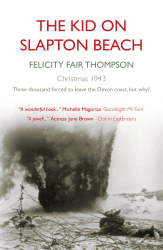 I’d like to tell you about The Kid on Slapton Beach. It is historical fact told through fictional characters. It has sold more than 2000 paperback copies in just seven indie book shops by direct sale from the publisher, and that’s not including chain book shops, worldwide and internet sales. Young Harry is one of three thousand people forced to leave the UK Devon coast in the Second World War as US troops move into the area for secret D-Day rehearsals in April 1944. But what if your most treasured possession is left behind?
I’d like to tell you about The Kid on Slapton Beach. It is historical fact told through fictional characters. It has sold more than 2000 paperback copies in just seven indie book shops by direct sale from the publisher, and that’s not including chain book shops, worldwide and internet sales. Young Harry is one of three thousand people forced to leave the UK Devon coast in the Second World War as US troops move into the area for secret D-Day rehearsals in April 1944. But what if your most treasured possession is left behind?
It’s hard to tell a story about a secret and not involve the internet.
To discover more about Felicity please see the links below:


December 15, 2015
Christmas Book Promotion
by Indie Authors
Are you a book worm or do you know one?
Fall into our super box of books this holiday season
and find the perfect present!
Click here to explore: Box of Words Holiday Promotion
Find your new Favourite Author!
*Anne L. Harvey *Kate Ryder *Jennifer Young *Mary Grand
*Michael E. Wills *Eric McFarlane *Cherry Wild & Sophia Soror
*Lucinda Blanchard *Sharon Booth *June Moonbridge *Joan Ellis
*Valerie Keogh * Sue Hewitt *Phyllis Goodwin *Pam Lecky


December 13, 2015
A Lady is Never Seen Without her Hat!
One of the many things about the Victorian era that fascinate 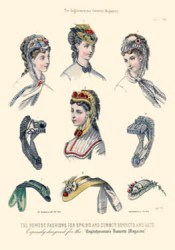 me is dress code. Like everything else in a woman’s life, it all seemed to be about limiting her freedom. Her reputation was precious and it took very little for it to be smudged. To be seen in public without a hat or gloves, was unheard of, no matter what class she came from. The colour red was considered shocking (floozies only!) and we are all aware of the mourning restrictions regarding black (that strangely didn’t apply to men, other than a black band on a sleeve!). Looking back it is hard to believe that women submitted to these strictures. But for anyone interested in costume and accessories, we have been left with a wonderful collection of artifacts to admire or collect.
me is dress code. Like everything else in a woman’s life, it all seemed to be about limiting her freedom. Her reputation was precious and it took very little for it to be smudged. To be seen in public without a hat or gloves, was unheard of, no matter what class she came from. The colour red was considered shocking (floozies only!) and we are all aware of the mourning restrictions regarding black (that strangely didn’t apply to men, other than a black band on a sleeve!). Looking back it is hard to believe that women submitted to these strictures. But for anyone interested in costume and accessories, we have been left with a wonderful collection of artifacts to admire or collect.
My particular favourite was the fan. They first appeared in Ancient Greece about the 4th century, and developed into a staple fashion accessory during the 17th century. The leaves could be made of anything from silk, or 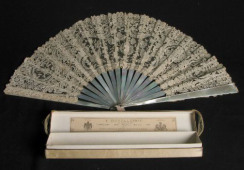 parchment to feathers, intricately decorated with jewels, lace, etc., while the sticks evolved from bone to ivory and tortoiseshell, often embellished with gold and silver work.
parchment to feathers, intricately decorated with jewels, lace, etc., while the sticks evolved from bone to ivory and tortoiseshell, often embellished with gold and silver work.
And they weren’t just to keep you cool. An entire language developed, used by young ladies to communicate with the opposite sex – a way to cope with the restricting social etiquette that prevailed in ballrooms throughout Europe.
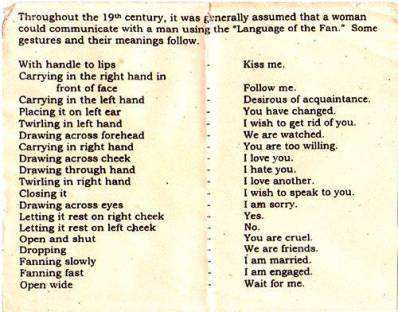
Chatelaines, often worn by the woman of the house, also intrigue me. They were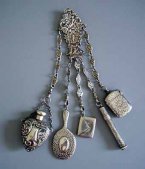 a set of short chains on a belt with a variety of useful items such as keys, sewing kit, scissors, watches, vinaigrette and household seals. They were symbols of power. Younger women in the house often wanted the appearance of this responsibility, and would wear decorative chatelaines with a variety of small objects in place of the keys. In a bachelor or widower’s house, the housekeeper would have worn it. Below is a particularly beautiful example.
a set of short chains on a belt with a variety of useful items such as keys, sewing kit, scissors, watches, vinaigrette and household seals. They were symbols of power. Younger women in the house often wanted the appearance of this responsibility, and would wear decorative chatelaines with a variety of small objects in place of the keys. In a bachelor or widower’s house, the housekeeper would have worn it. Below is a particularly beautiful example.
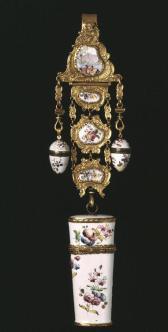 Copyright Victoria & Albert Museum
Copyright Victoria & Albert MuseumAnd o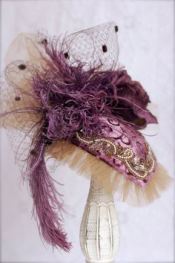 f course there were hats. Lots of hats. Big ones, small ones and delicate ones. Sigh!
f course there were hats. Lots of hats. Big ones, small ones and delicate ones. Sigh!
But of course it would be the Edwardians who would take the hat to its most glorious … but that’s another day’s post.
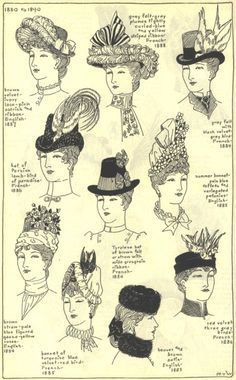


December 11, 2015
A Conversation with Author, Marie Laval
Today in the Library we have Marie Laval, who has dropped in to say hello and to share some insights into her life as an author.
Pl
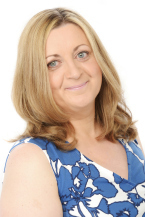 ease introduce yourself, Marie:
ease introduce yourself, Marie: I was born and brought up near Lyon, in France. After studying at university there I moved to England and worked at the University of Manchester for several years. When I had my second son, I decided to retrain as a teacher and move to the Rossendale Valley in Lancashire. It’s a lovely place, even if it does seem to rain more there than anywhere else in England! I love writing, researching stories, and dreaming up romantic heroes and heroines…
Did you read much as a child? Are you an avid reader now? Do you prefer books in your own genre or are you happy to explore others?
I always loved reading. As a child and teenager you could always find me with my nose in a book. I used to have very eclectic tastes and read a wide range of genres but I have become a lot more sensitive than I used to be these past few years, and I now find it difficult to read about death, loss, and grief. Therefore I don’t often read crime novels or really sad stories. I read a lot of romance, and historical material when I research for a novel.
Are you self-published or traditionally published?
I am traditionally published. All my novels are published by Áccent Press.
Which genre do you write in and why?
I write romance, both contemporary and historical, because I like happy endings. For me romance is the ultimate escapism, especially historical romance.
Who has been the biggest influence on your writing?
That’s a very difficult question! There have been so many authors whose work really made a big impression on me. If I had to pick a few, I would say that some of my all-time favourite writers are Wilkie Collins, Joseph Kessel, Barbey d’Aurevilly and Maupassant.
Has your country of origin/culture influenced your writing?
Very much so. I have drawn inspiration from my childhood in France, from my beautiful hometown Lyon, my family holidays in Provence and more generally from my whole upbringing. My mother was a French national born and brought up in Algeria and her wonderful stories, legends and superstitions filled my imagination from a very young age. I have drawn on my fascination for her stories when I wrote my historical romance, THE LION’S EMBRACE, and all of my short stories. One of these short stories, THE CEMETERY OF THE TWO PRINCESSES, was published in an anthology SHIVER which was released by Áccent Press last year for Halloween.
What part of the writing process do you find most difficult? How do you overcome it?
I love writing and researching but I’m not very good at plotting. In fact I am really bad at plotting, which means that I often have to rewrite whole chapters time and time again, delete sub-plots, add new characters or ‘kill’ others! Every time I start a new story I vow to be more of a ‘plotter’ but somehow it never happens.
Do you have a favourite time of day to write?
Any time works for me! With a full-time job and a busy family life, I have to grab whatever writing time I can get.
What is the best thing about being an author? And the flipside – what is the worst?
I don’t like promoting myself, probably because I am not very good at it.
Is social media an essential chore or something you enjoy? Which forum do you prefer?
I have learned a lot these past four years about the industry and I have made really good friends thanks to social media. I do prefer Facebook to Twitter because basically I have no idea what I am doing on Twitter!
I have made really lovely friends thanks to Facebook, several of whom I have the great pleasure to have lunch with once in a while in Hebden Bridge, Yorkshire.
If you weren’t an author, what would you be up to?
I cannot imagine not writing. Even if I wasn’t published, I would still write my stories…
It’s the last day and the earth is facing oblivion – what book would you read?
My daughter’s poems and stories. She is ten years old and has a wonderful imagination and she makes me smile.
Please tell us about your latest published work.
My historical romance THE DREAM CATCHER, which is 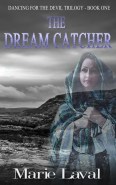 set in 1847 in the far north of Scotland, was released by Áccent Press at the end of November. I am very excited about this release because THE DREAM CATCHER is part of a trilogy and I have never written a trilogy before. The other two parts will be released at the end of January and March.
set in 1847 in the far north of Scotland, was released by Áccent Press at the end of November. I am very excited about this release because THE DREAM CATCHER is part of a trilogy and I have never written a trilogy before. The other two parts will be released at the end of January and March.
To learn more about Marie check out the links below:


December 9, 2015
A Conversation with Author, Iza MacLeod
This evening in the Library we have Iza MacLeod, who has dropped in to say hello and to share some insights into her life as an author.
Please introduce yourself:
I’m a vegan who loves chocolate, animals and wine, and I’m an English girl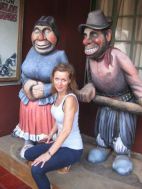 in my thirties who grew up in Coventry/ Warwickshire. I’ve lived in Argentina and France and I now live in Mallorca with my husband, and dog that we found on the streets of Argentina.
in my thirties who grew up in Coventry/ Warwickshire. I’ve lived in Argentina and France and I now live in Mallorca with my husband, and dog that we found on the streets of Argentina.
I began writing in 2011. My first romantic fiction novel, Buenos Días Lucy London, is set in Argentina/UK and was published last year.
Did you read much as a child? Are you an avid reader now? Do you prefer books in your own genre or are you happy to explore others?
Yes, I read quite a lot as a child – Roald Dahl, Enid Blyton and Judy Blume. I’ve been an avid book fan intermittently since a young age, finding saviour in reading after a relationship break-up, and later finding comfort in writing during a period of bereavement.
I like to explore different genres but fictional romances set in foreign countries tend to be what I am drawn to most.
Are you self-published or traditionally published?
Self-published
Which genre do you write in and why?
Romantic fiction set in foreign lands. This is probably because I enjoy travel so much, and with the two books that I’ve written so far, both stories are based in a country, and location, that I have lived. I enjoy reading and learning about different countries and cultures so I like to write about some of the things I have experienced and learned in the countries that I have lived.
Who has been the biggest influence on your writing?
Gregory David Roberts – he’s a great story teller, and what a story! Despite having been in prison and a drug addict and not having studied creative writing or literature or come from a writing background, he has still become a successful novelist. I’ve never been a criminal, like he has, but I don’t have an artistic/creative writing background either.
If I can name a second … it would be Stephen King. I’ve only read a few of his books but I also read On Writing, which I found to be of great use by listening to his advice. The story of his life was interesting and inspirational too.
Has your country of origin/culture influenced your writing?
Yes. I like to write from the heart and from my experience and opinions of an English/Midlands working girl, which is what I am. I like to use the language and Midlands/British phrases in my book that I often use myself.
What part of the writing process do you find most difficult? How do you overcome it?
Marketing. I just keep taking small steps and learn as I go along, and never give up!
Do you have a favourite time of day to write?
Yes, in the morning – I seem to function better and feel at my most creative first thing.
What is the best thing about being an author? And the flipside – what is the worst?
The best thing is becoming so engrossed in the stories of my fictional characters that I feel like they are my real companions/friends. I also like being in control of the lives of each character and deciding what will happen. And the worst thing? Coming back into reality.
Is social media an essential chore or something you enjoy? Which forum do you prefer?
I only joined Facebook when Buenos Días Lucy London, was published, and I’ve only been on Twitter for a few months. I enjoy using both social media sites to interact with other authors and potential readers, but I don’t have a preference.
If you weren’t an author, what would you be up to?
I’d perhaps be socialising a bit more or learning another language.
It’s the last day and the earth is facing oblivion – what book would you read?
To Kill A Mocking Bird. I hate to admit that I’ve still not read it!
Please tell us what you are working on at the moment.
I’m currently working on my second fictional romance, Katie Cannes,  which is set on the Côte d’Azur. I’ve actually completed the 94,000 word manuscript and am now reading through it and making minor changes. I hope to have it published this year.
which is set on the Côte d’Azur. I’ve actually completed the 94,000 word manuscript and am now reading through it and making minor changes. I hope to have it published this year.
You can learn more about Iza and her work by following these links:


December 4, 2015
A Conversation with Author, Sean MacCotter
Today in the Library we have Sean MacCotter, who has dropped in to say hello and to share some insights into his life as an author.
Thanks for dropping by, Sean, tell us a little about yourself:
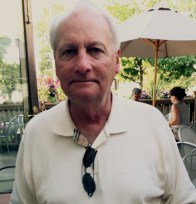 This author thing has come to me pretty late in life. I suppose you could find my name listed in the dictionary under ‘procrastinator’. When I was a child in post-war England, I was exposed to three things which have stayed with me throughout the years and finally brought me to my keyboard. First, I was a Yank, pretty well isolated in a foreign country surrounded by sights and experiences which would fill any young lad with wonder. I lived directly atop the cliffs in Southeast England, near the old Roman fort of Reculver, with playmates who actually lived in a castle. That’s a Wizard of Oz experience for a boy from Kansas City. Second, being alone much of the time, inspired by my librarian grandmother, I read a LOT – Robin Hood, Ivanhoe, Shakespeare, boy stuff. Third, I had a school teacher who knew the history of the area and always shared the little things that bring old events to life.
This author thing has come to me pretty late in life. I suppose you could find my name listed in the dictionary under ‘procrastinator’. When I was a child in post-war England, I was exposed to three things which have stayed with me throughout the years and finally brought me to my keyboard. First, I was a Yank, pretty well isolated in a foreign country surrounded by sights and experiences which would fill any young lad with wonder. I lived directly atop the cliffs in Southeast England, near the old Roman fort of Reculver, with playmates who actually lived in a castle. That’s a Wizard of Oz experience for a boy from Kansas City. Second, being alone much of the time, inspired by my librarian grandmother, I read a LOT – Robin Hood, Ivanhoe, Shakespeare, boy stuff. Third, I had a school teacher who knew the history of the area and always shared the little things that bring old events to life.
As an adult, I had occasions in the military and business to travel back to England and Europe many times. Each time, I would try to spend a day or two away from the ‘sights’ and walk the streets of the villages and fields which are the real heart of any country.
As I grew older, I inherited my grandmother’s mantle as the family historian, along with her voluminous collection of books and original documents (back in the days before Al Gore invented the internet). Until I retired, I collected facts and added them to our family database. I guess you’d say I’m a collector of memories.
When I retired I found myself surrounded with crate loads of old family pictures, documents and random bits I’d found interesting at one time or another and decided to organize them and file them away. One high resolution scanner and more than 10,000 documents later, I finished that job.
From there, I turned to writing documented narratives for my family to bring some relevance to them from all this hoard. Family members read the things I’d prepared for their eyes only and encouraged me to write something for a wider audience.
Finally, after sixty years of waiting, I wrote my first book, The Key, about the fictional adventure of a very distant relative of mine from a little town in Berkshire who goes off to fight in the crusades. The writing has been great fun, and the research to fill in the huge gaps in my knowledge has taken me back to those Medieval days I imagined playing knights on the cliffs over the North Sea.
Did you read much as a child? Are you an avid reader now? Do you prefer books in your own genre or are you happy to explore others?
I read a lot of books as a child. As I said before, I spent a lot of time alone in England, and later moving frequently from place to place in a military family.
Since I began writing narratives and novels a few years ago, most of my reading has been limited to research. While I enjoy digging out little known facts, I miss having time to sit with a good read and enjoy the trip. I’m taking off the next couple of months from writing to enjoy the holidays and read a few entire books.
I tend to be a binge reader. If I find an author I enjoy, I’ll read as many of his/her books as I can until I get bored. Then I’ll move on. The same goes for genre. I’m about historied and biographied out for a bit. I think I’ll turn to some quantum mechanics or other science topics – I’m pretty obsolete when my grandchildren are asking me questions I can’t answer. I read your historical romance, The Bowes Inheritance, a few months ago (my first romance that I recall), and found I enjoyed it much more than I expected – so I might add a few more to my stack.
Thanks, Sean. Are you self-published or traditionally published?
I’m self-published at this point. I wanted to test the waters for acceptance of my writing before I invest too much time and money publishing. I set a goal for myself to write and publish The Key Trilogy as an e-book first. Then, invest the proceeds from that into printing the same three books. And then, if they are reasonably successful, approaching publishers for future books.
Which genre do you write in and why?
I write historical fiction. I am an historian at heart and am fascinated by the details of the lives of the lesser known people and events who create history. If I can write an interesting story which, in its telling, pulls the reader into the life and times of the characters, I’ve succeeded. Regrettably, most history is written by and for academics, which most general readers find dry and difficult.
Who has been the biggest influence on your writing?
I can’t name a single person. My grandmother introduced me to research. Various teachers encouraged me to write non-fiction and creatively. Reading a wide variety of authors and topics broadened my world view. My family’s encouragement and support has probably been the most influential.
Has your country of origin/culture influenced your writing?
Certainly. No one can avoid the effects of their environment. I try to write in the world in which my characters live, but I’m sure my own biases creep in. Basically, I’m an American with a strong English history and experience. It’s easiest to write in that world.
What part of the writing process do you find most difficult? How do you overcome it?
I tend to over complicate plots and find myself 1,000 or so words off track when I get really inspired. After a cup of strong coffee and a slap upside my head from my alter-ego I overcome it by a liberal application of the Del key.
Do you have a favorite time of day to write?
Early, early morning. Between 5am and 9am, before the real world interferes with my concentration.
What’s the best side about being an author? And the flipside – what is the worst?
The best thing so far is giving birth to all the stories I’ve locked in my head over the years. So far, I’ve not had a worst – except possibly not being number one on the New York Times Best Seller List – yet. I’m not sure what will happen when the ‘easy’ stories are all on paper. Will it become work, or still be fun. I’ll let you know in a few years.
Is social media an essential chore or something you enjoy? Which forum do you prefer?
I’m very new to social media. Throughout my career, someone else was always responsible to round up my audiences; then I walked on stage and presented my topic du jour. Now, I’m having to build my own market – totally new concept. I’m still learning. Right now, I’m somewhere between a chore and enjoyment.
If you weren’t an author, what would you be up to?
I’d be travelling. Exploring new things. Learning new ‘stuff’. And boring my family having to listen to me tell me about my day – in excruciating detail.
It’s the last day and the earth is facing oblivion – what book would you read?
The Bible – my grandmother’s dog-eared copy so I could make sure to read all the good stuff before the oblivion part happened.
Please tell us about your latest published work.
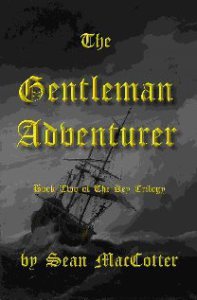 I just finished The Gentleman Adventurer: Book Two of The Key Trilogy. The Kindle copy hit the cyber-street on November 23rd.
I just finished The Gentleman Adventurer: Book Two of The Key Trilogy. The Kindle copy hit the cyber-street on November 23rd.
You can find it on:
In U.K. Amazon.co.uk
In U.S. Amazon.com



